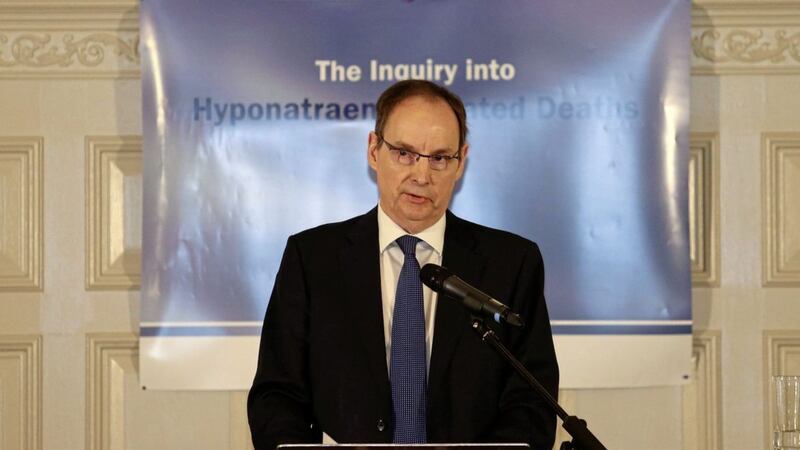THE professionalism, compassion and patience with which Sir John O'Hara and his team have conducted the inquiry into the hyponatraemia-related deaths of five children in hospital has resulted in a report of significant public interest.
Other public servants now have a clear duty do follow up on its recommendations.
One might not be hugely confident that this will happen with alacrity after measuring the report's contents against thus-far underwhelming responses from the department of health, various medical governing bodies and politicians.
In exploring the circumstances around the deaths of the children - four-year-old Adam Strain, nine-year-old Claire Roberts, nine-year-old Raychel Ferguson, 18-month-old Lucy Crawford and 15-year-old Conor Mitchell - Mr Justice O'Hara concluded that four of the deaths were avoidable.
That would be bad enough - appalling, even, especially for the families - but the litany of obfuscation, denial and evasiveness that the inquiry encountered from doctors, nurses, administrators and others is astonishing.
It is almost enough to disabuse the non-medical lay person of faith in the Hippocratic oath, never mind erode the principle of 'first, do no harm' and the hope that mistakes, when they happen, are seized upon as learning opportunities.
In clipped, forensic prose, Mr Justice O'Hara explains that there was an "indefensible" culture in which the children's parents were "deliberately misled" by doctors and managers concerned with avoiding scrutiny and protecting their own reputations.
Two consultants involved in the care of Claire Roberts attempted to cover up how her death could have been avoided. The inquiry's scrutiny of her death came about "despite the efforts of doctors in the Children's Hospital, not because of them. Phrases like "concealment", "deceit", "did not admit to error" appear in the report; testimony had to be "dragged" from one consultant.
Legitimate media inquiries were aggressively rebuffed, including with recourse to solicitor's letters; nonetheless, diligent public interest journalism, chiefly from a UTV Insight investigation in 2004, was the catalyst for direct rule minister Angela Smith setting up the inquiry in 2004.
Mr Justice O'Hara remains concerned about how whistleblowers and their evidence was treated, and the inquiry continues to investigate in this area.
And so it goes on. It is difficult to think of a more damning assessment of health professionals or management.
Yet we don't know if those named in the report are still working in our hospitals, if they remain involved in management of our trusts, if they continue to be involved in training students or if they have been sanctioned.
Reasonable people - even unreasonable ones - realise that hospital care is laced with risk and that, tragically, mistakes do occur which can lead to the otherwise avoidable death of a patient.
In such circumstances, it is appropriate to expect honesty, never mind empathy and compassion, from those entrusted with patient care.
It is also essential that mistakes are learned from, for the blindingly obvious reason that it might help avoid a similar tragedy.
Arrogance and self-interest played a role in doctors not owning up to mistakes, but it was facilitated by a lack of oversight and scrutiny from management.
It is unclear from the responses thus far if the Augean stables of, as Mr Justice O'Hara describes it, "institutional complacency" in hospitals have been washed clean.
The department of health last week issued a statement in the name of its most senior civil servant, Richard Pengelly.
It was a classic piece of Sir Humphreyism. Side-stepping some of the more difficult parts of the report, such as the attempted cover up and whether any of those named in the report are still active in our hospitals, Mr Pengelly promised a "dedicated team" would report directly to him and work on an "action plan" to address the inquiry's 96 recommendations. No timeline was advanced.
The reasonable person might have imagined that a more dynamic department of health would have done its best to get ahead of at least some of the recommendations in advance of their publication.
Sharing progress on its work around the duty of candour would have been an obvious place to start.
The bread and circus carousel of our public discourse means that some fresh row over flags, wood pellet boilers, the Irish language, wheel clamps or respect will inevitably emerge, with the risk that rebuilding public confidence in health care will get lost amid the sound and fury.
The hyponatraemia report's recommendations should not be allowed to gather dust. The memory of Adam Strain, Claire Roberts, Raychel Ferguson, Lucy Crawford and Conor Mitchell deserves better.









